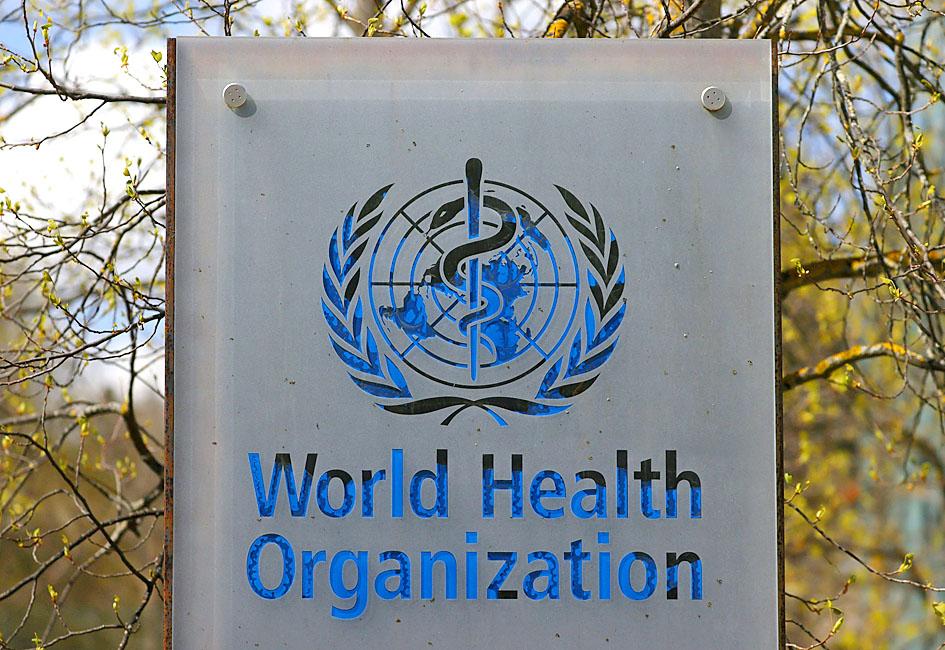The Ministry of Foreign Affairs yesterday thanked the World Medical Association (WMA) for supporting Taiwan’s participation in the WHO, which it again called on to maintain a professional and neutral stance and reject political interference from China.
The WMA General Assembly was held online in London from Monday through Friday.
The Chinese Medical Doctor Association (CMDA) raised a motion to prevent Taiwan’s participation in the WHO, but the motion was rejected 99-19 in a vote.

Photo: Reuters
The general assembly voted 91-16 in favor of a resolution supporting Taiwan’s participation in all WHO health programs, as well as the World Health Assembly, the WHO’s decisionmaking body.
The WMA is the world’s largest international organization representing physicians and consists of 115 national medical associations, the ministry said, adding that it has maintained close relations with the Taiwan Medical Association for many years.
The WMA in May 2005 adopted a resolution supporting Taiwan’s participation in the WHO and its inclusion in the International Health Regulations (IHR) mechanism, and the latest resolution is of great significance, the ministry said.
The proposal submitted by Taiwan this year was approved by the WMA’s professional committees and the WMA Council, before being submitted to the general assembly to be voted on, it said.
The CMDA tried to interfere with Taiwan’s proposal, but fortunately most of the WMA’s constituent members were consistent in supporting Taiwan’s participation in the WHO, the ministry said.
The resolution represents the competence and conscience of physicians worldwide, highlights the importance of Taiwan’s participation in the WHO to the global health network, and shows that the quality of Taiwan’s healthcare and the nation’s success in fighting COVID-19 under a democratic model has been recognized globally, the ministry added.
Democratic Progressive Party spokeswoman Hsieh Pei-fen (謝佩芬) yesterday said that the party expresses its sincere gratitude to the WMA, as the resolution not only shows support for Taiwan, but also a growing force of goodness from around the world.
Deputy Minister of the Interior Chen Tsung-yen (陳宗彥), who is deputy head of the Central Epidemic Command Center, said the center expresses its gratitude to the like-minded countries in the WMA that supported Taiwan.

MAKING WAVES: China’s maritime militia could become a nontraditional threat in war, clogging up shipping lanes to prevent US or Japanese intervention, a report said About 1,900 Chinese ships flying flags of convenience and fishing vessels that participated in China’s military exercises around Taiwan last month and in January last year have been listed for monitoring, Coast Guard Administration (CGA) Deputy Director-General Hsieh Ching-chin (謝慶欽) said yesterday. Following amendments to the Commercial Port Act (商港法) and the Law of Ships (船舶法) last month, the CGA can designate possible berthing areas or deny ports of call for vessels suspected of loitering around areas where undersea cables can be accessed, Oceans Affairs Council Minister Kuan Bi-ling (管碧玲) said. The list of suspected ships, originally 300, had risen to about

DAREDEVIL: Honnold said it had always been a dream of his to climb Taipei 101, while a Netflix producer said the skyscraper was ‘a real icon of this country’ US climber Alex Honnold yesterday took on Taiwan’s tallest building, becoming the first person to scale Taipei 101 without a rope, harness or safety net. Hundreds of spectators gathered at the base of the 101-story skyscraper to watch Honnold, 40, embark on his daredevil feat, which was also broadcast live on Netflix. Dressed in a red T-shirt and yellow custom-made climbing shoes, Honnold swiftly moved up the southeast face of the glass and steel building. At one point, he stepped onto a platform midway up to wave down at fans and onlookers who were taking photos. People watching from inside

Japan’s strategic alliance with the US would collapse if Tokyo were to turn away from a conflict in Taiwan, Japanese Prime Minister Sanae Takaichi said yesterday, but distanced herself from previous comments that suggested a possible military response in such an event. Takaichi expressed her latest views on a nationally broadcast TV program late on Monday, where an opposition party leader criticized her for igniting tensions with China with the earlier remarks. Ties between Japan and China have sunk to the worst level in years after Takaichi said in November that a hypothetical Chinese attack on Taiwan could bring about a Japanese

The WHO ignored early COVID-19 warnings from Taiwan, US Deputy Secretary of Health and Human Services Jim O’Neill said on Friday, as part of justification for Washington withdrawing from the global health body. US Secretary of State Marco Rubio on Thursday said that the US was pulling out of the UN agency, as it failed to fulfill its responsibilities during the COVID-19 pandemic. The WHO “ignored early COVID warnings from Taiwan in 2019 by pretending Taiwan did not exist, O’Neill wrote on X on Friday, Taiwan time. “It ignored rigorous science and promoted lockdowns.” The US will “continue international coordination on infectious